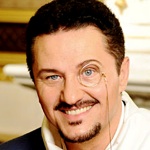
The complete transcript is after the jump.
“Piotr Beczala, one of the best: With a smile and a tear”
It is not as if good tenors suddenly fall out of the sky, although it sometimes may appear so. A voice has to grow, to mature, experiences need to be undergone, and the repertoire has to be expanded. Only by slowly building it up, you eventually arrive there. And more importantly, you stay there. A conversation with Piotr Beczala.
Text: Basia Jaworski [translation by Buster]
For a long time, the Polish tenor was a real insiders’ tip. His professional career started in Linz, in 1997, but he was discovered in Zürich. That opera house seems to have a good nose for tenors, both Jonas Kaufmann and Pavol Breslik came from there as well.
He has sung a lot of fabulous roles, many of which can be seen on DVD (his Duca in Rigoletto, and Alfredo in La Traviata are by no means to be sneezed at).
Beczala: One has to have patience, not rushing things. Not accepting roles which do not fit you. I used to be a notorious nay-sayer. It is almost unbelievable what roles were offered to me. Roles I could never sing, certainly not then. But I stayed firm, because I did not want to be a nine days’ wonder. Nowadays, after a career of twenty years, I know, and am capable of much more. My voice has developed, has grown bigger, and darker. My technique is solid, and I am more secure now, which means I can concentrate more on acting. Most roles that are offered to me now, I can either sing already, or will be able to shortly, so I have to say “no” less and less. Those responsible, the casting directors and directors of opera houses, know very well what I will accept, and what not, meaning I get less and less idiotic requests. If they still make me one, I say “no.”
Lyrical tenor
Beczala looks like a leading man from a pre-war movie. He has an exceptional acting talent, not unimportant nowadays. Yet, record contracts did not come, something which, perhaps, was good for him. This way he was able to develop in peace, well, in relative peace at least, without noisy advertisement campaigns, to what he is now, at age 45, one of the best lyrical tenors in the world. Before making his debut in, amongst other places, Salzburg, Covent Garden, the Wiener Staatsoper, San Francisco, and the Metropolitan Opera House, he has also sung in Amsterdam. Three parts, no less, in Szymanowski’s Krol Roger (the Shepherd), Tchaikovsky’s Onegin (Lenski) and Puccini’s La bohème (Rodolfo). Beczala has a beautiful, lyrical tenor voice, with a smile, and a tear. His slightly old-fashioned timbre evokes memories of Wunderlich, Gedda, or even Kiepura. With his predecessors, he shares a love for operetta, a genre he sings often, and with pleasure.
Exclusive contract
Operetta may be seen and heard again. Even the smartest opera houses program operettas nowadays. The yearly operetta galas in Dresden, around Christmas, have become famous, and reach a lot of television viewers. The Staatskapelle Dresden is conducted by no other than Christian Thielemann, and joining Beczala are one or more sopranos. In 2011, Angela Denoke and Ana Maria Labin participated. In 2012, the scheduled Diana Damrau had to cancel at the last moment because of illness, and was replaced by Ingeborg Schlöpff. Both galas have been issued by DG.
In the meantime, record companies could no longer ignore Beczala himself. Last fall, he signed an exclusive contract with DG. Because of his love for the genre, it comes as no surprise that his first DG solo disc is an operetta recital.
Beczala: The CD was recorded in November, has been assembled, and is ready for release. It will be issued in May, extremely exciting! DG gave me the green light in the choice of the orchestra, and the conductor. I immediately thought of the young Polish conductor Lukasz Borowicz, with whom I have recorded a CD with Slavic opera arias before (Orfeo C814 101). Also the choice for the orchestra was clear from the start, it had to be the Royal Philharmonic. The program is simple: from operettas by Lehár and Kálmán to Robert Stolz. From Ich Liebe Dich, Ich Küsse Ihre Hand Madam, Das Lied Ist Aus, O Mia Bella Napoli, Ob Blond Ob Braun tot Carl Böhm’s Still Wie Die Nacht. More musicians have cooperated on the CD: singer Anna Netrebko, mandolin player Avi Avital and the vocal ensemble The Berlin Comedian Harmonists. A special guest singer is Richard Tauber. The Austrian tenor died in 1948, but with the help of modern technology I can now sing a duet with him. If that is not special…
Expanding the repertoire
For the first time Beczala is recording exclusively for one record company.
Beczala:Up to now, I have only recorded solo recitals for Orfeo. Two have appeared thus far: Salut! and Slavic Opera Arias. Both contain, besides well known arias, completely unknown works: Les Dragons de Villars by Maillart and Maître Pathelin by Bazin, but also arias by Arenski, Zelenski, and Nowowiejski. The third solo recital (Verdi) is scheduled for February. I do not wish to enter the history books as an operetta singer, and want to do a little more with Lieder. Right now, I am only exploring the genre. With Thielemann I have sung Strauss songs, and in Santa Fe I gave a recital with works by Schumann and Karlowicz, an unusual but beautiful combination, I think. Now is the time to expand my repertoire. Around 2015, I will try out heavier parts. First Hoffmann in Les contes d’Hoffmann (2014, Vienna), but also Manrico (Il Trovatore), and Cavaradossi (Tosca) are in the picture. And Lohengrin, with Maestro Thielemann. With him, I dare to do it. Actually, I do not want to plan further ahead than three years, but I am already booked until 2018.
Can we expect the tenor back in Amsterdam? Beczala sighs deeply.
Beczala: Who knows, I have a new agent now. Amsterdam is certainly not excluded, particularly not the beautiful Concertgebouw. I would love to sing in one of those saturday matinees there. “Regietheatre” is also one of the reasons I have declined a few offers from Amsterdam. I have a little black book with names of directors, and conductors with whom I never wish to work again. The name of Calixto Bieito is at the top. But, also, no more Hans Neuenfels or Martin Kusej for me. I have absolutely nothing against updating a piece, as long as it stays recognizable. I am not at all against modern, but against stupid, idotic, or far-fetched. I refuse to work as a group therapist for off the rails directors, to pay for their therapy, in which they can indulge in their undealt with frustrations. So, yes, I have had arguments with directors, for example with David Poutney in Zürich recently, during Un Ballo in Maschera. We talked for two days, but came to an agreement. I have the good fortune I can either accept things or refuse them, but many of my (starting) colleagues don’t have these privileges. Sometimes they think they will make it, when they partake in a much discussed production, but it does not work like that. In our profession you make it with your musicality, and dedication. Directors often think they are god, but you must not surrender yourself to them, but to the geniality of the composer. I also wish to work no longer with conductors that have no respect for singers. I will not name names, but most of them come from the “old music.”
Which director do I admire the most?
Beczala: Franco Zeffirelli is more than a director, he is a monument. At the moment, you can see him as cultural heritage. His productions are always fabulous, they need to be cherished. It was a party for me to work with him. I also admire Guy Joosten a lot. His Romeo et Juliette at the Metropolitan Opera House was really beautiful. We singers too, enjoyed it tremendously. But the best of the best? For me, that is Nello Santi, without a doubt. But I also love Marco Armiliato.
Beczala defines the big difference with singers who start to conduct (think Placido Domingo) as follows:
Beczala: Domingo has the bad luck he is living in the now, the present. How should I explain? The difference between a “singer conductor” and a “regular” conductor is like the difference between a pianist and an organist: the pianist thinks about the sound that can be heard now, the organist thinks ahead, about the resonance of the sound to come.
Beczala is practically always on the road. How does it feel to be nowhere really at home? The singer laughs.
Beczala: In the meantime, we are at home everywhere, although my wife Kasia loves New York the most. Our real “home” is Kraków, in Poland, but nowadays we spend only two weeks a year there. Luckily, I have apartments in the cities I perform in the most: Vienna, Zürich, and New York, That is nice, and feels familiar. I have my own bed, my own toilet, and my own wine. That helps!



